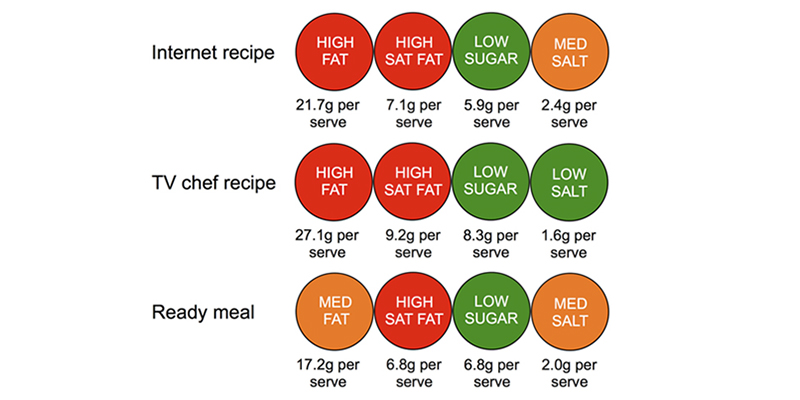How healthy are online recipes really?
April 13, 2017
How healthy are online recipes really and what impact does the "health factor" have on online recipe recommendation systems? The Internet has become the most popular source of inspiration for people in search of new and healthy recipes. According to a recent market agent study conducted in Vienna in February 2017 for the British star cook Jamie Oliver, over 50% of all respondents surveyed went online for cooking recipes. Similar results were already obtained in 2012, in a study conducted by researchers from the prestigious Stanford University in California, USA and Microsoft in Redmond, USA.
The search for recipes on the Internet is now more popular than the traditional use of cookbooks. But how healthy are online recipes really, and what impact do recommender systems have, e.g. from Amazon or Netflix, on our selection process and, in turn, on our health? To answer these questions, an international team led by Asst. Prof. Dr. Christoph Trattner investigated hundreds of thousands of recipes from leading online recipe portals over the course of more than a year.
In the first step, the researchers compared online recipes from Allrecipes.com, the largest online food portal on the Internet, with recipes from popular TV cooks and supermarket ready meals. The nutritional guidelines published by the World Health Organization (WHO) and the UK Food Standards Agency were used to assess the "health factor" of a meal.
The results of this first analysis showed that online recipes are more likely to be unhealthy in direct comparison to recipes from popular cookbooks (like Jamie Oliver's, for example) and unhealthier than the tested ready meals from the supermarket. Only six of the 5237 analysed Allrecipes.com recipes fully met the WHO's recommendations for healthy eating.
Furthermore, the researchers determined that online recipes less frequently fulfil the recommended nutritional value criteria for fat, saturated fat and dietary fibre. Interestingly, they were unable to detect any significant differences in sugar content between the various recipe sources (a criterion often used by nutritionists as a reason for being overweight in our society).
Repeating the analysis for the period from 2000 to 2015 also shows stable results. The scientists could not find a trend according to which online recipes become "healthier" or "unhealthier" over time. More on these analytical comparisons can be found online in the journal "Frontiers in Public Health". The article "Estimating the Health of Internet Recipes: A Cross-Sectional Study" by C. Trattner, D. Elsweiler and S. Howard.
In a further step, Trattner and his colleagues investigated Internet recipes on a categorical level (such as "main dishes", "desserts", "breakfasts", etc.). They noted that different categories (such as "supplements") are not only significantly healthier than others (such as "dinner"), but the "health" of a recipe is also difficult to assess by users.
"In over 90% of cases, it was not possible for our 32 subjects to correctly determine the extent to which a category in Allrecipes.com is now healthy or unhealthy," said Trattner.
In another experiment, where more than one million interactions with online recipes of over 100,000 users were evaluated, the researchers also found that unhealthy recipes were not only significantly better rated (than healthy ones), but also significantly more likely to be bookmarked or commented.
These findings have far-reaching consequences, considering that common recommender approaches, such as those found in Amazon's or Netflix’ algorithms, are based on the principle of recommending more popular or highly rated items. Therefore, it can be concluded that current recommendation systems recommend unhealthy recipes.
To prove this empirically, Trattner and his colleagues analysed several large scale offline experiments with thousands of real user interactions in the online recipe platform Allrecipes.com and their most popular recommendation algorithms and found that these approaches produce unhealthy recommendations.
To tackle this issue, Trattner and his colleagues present a very simple method in their work that can tune current recommender algorithms in such a way that that they are also capable of producing healthy recommendations. According to Trattner, their results have significant implications for the design of future recipe and food recommendation systems.
The article was presented by Trattner on April 5th, 2017 in Perth, Australia at the CORE A * ranked World Wide Web Conference, the most important international conference in the field of WWW and information science. In addition, Trattner was awarded the "Best Paper Honorable Mention Award" during this conference. This prize not only underscores the international significance of scientific work, but also honours authors for exceptional scientific achievements. At the World Wide Web Conference, around 1000 scientific contributions are submitted every year, with only 17% accepted, and only a handful of the accepted work is wins an award.
More information can be found on Christoph Trattner's website.
Image: Simulated front-of-package labels for an average Internet recipe on Allrecipes.com, a recipe created by a television chef, and a supermarket ready meal, based on health guidelines published the UK Food Standard agency. The image clearly shows that Internet recipes are on average less healthy than TV chef recipes and supermarket ready meals.





